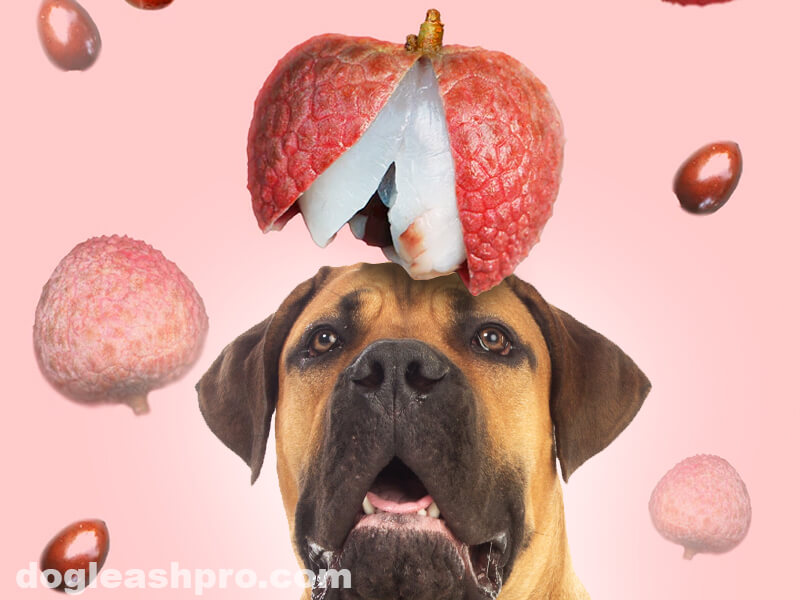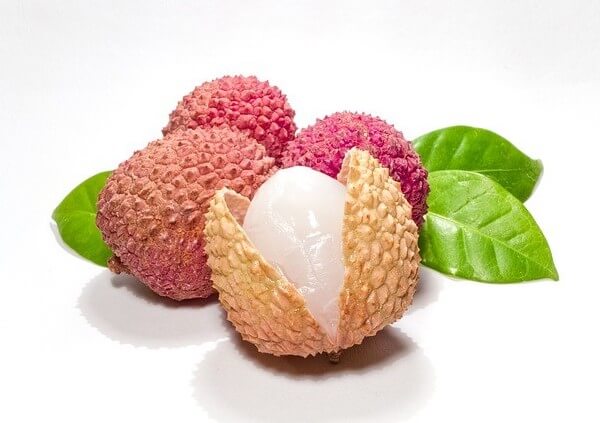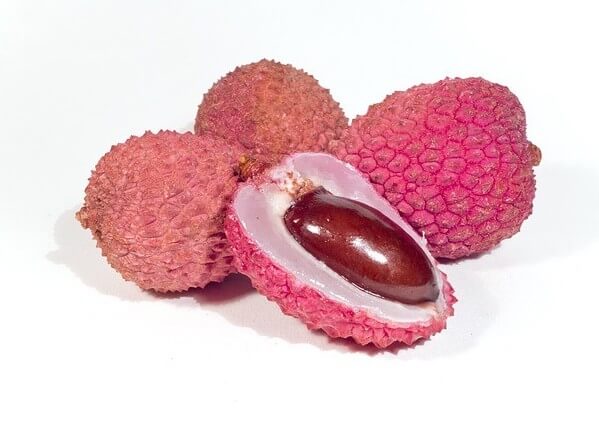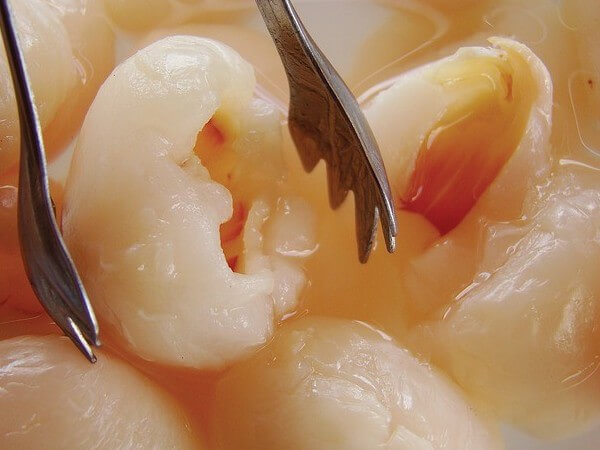
Can dogs eat Lychee? Yes, dogs can eat Lychee provided that they avoid the skin of this fruit as well as the seed. Lychee pulp isn’t toxic to dogs. But considering the high sugar content of Lychee and lack of research on how it would affect dogs, it is best to feed them Lychee in moderation.
Summer season is heading our way and that means we will see the exotic Lychee fruit in our local supermarket or grocery store. My mom loves Lychee. Once she bought 3 pounds of Lychee.
My yellow Labrador could smell the sweetness of this fruit and nudged my mom with her nose for some. Before we gave her the Lychee, we wondered if this fruit is safe for dogs to eat.
Table of Contents
Is Lychee good for dogs?

While there are no reports of Lychee causing any severe side effects in canines, their safety is still under question. In theory, Lychee shouldn’t pose any health risks to dogs as they don’t contain any unsuitable chemicals. However, the dangers associated with unripe Lychee, Lychee seeds, and Lychee peel cannot be ignored.
Lychee seed and peel can cause intestinal blockage and injury. When Lychee is unripe, it contains toxins that can cause hypoglycemia and gastrointestinal issues. The seed also contains toxic substances, which make them unfit for consumption.
To fully understand what Lychee is and whether it is safe for dogs to eat, let’s go over this fruit in more detail.
What is Lychee?
Lychee is a berry-like fruit with a sweet taste and floral scent. It has a rough, leathery shell exterior with white pulp and a big seed in the inside.
What is Lychee fruit?
Lychee fruit is another name for Lychee.
Where does Lychee come from?
Lychee come from China, Southeast Asia, parts of Africa, Latin America, and the United States.
What is Lychee jelly?
It is a gelatinous dessert made with sugar and Lychee flavoring.
READ NEXT: Can Dogs Eat Jello? Complete Guide to Dogs & Gelatin
What is a Lychee nut?
Lychee nut is another name for Lychee.
Can dogs eat the whole Lychee?
No, dogs should not eat the whole Lychee. It is best that our furry friends only eat the white pup or flesh inside the Lychee and not the whole thing.
The fruit is the size of a ping-pong ball, meaning it can easily get lodged inside a dog’s throat or intestinal tract. To avoid this painful situation, make sure to always peel the rough shell off the Lychee first and remove the pit before letting your pooch eat it.
Are Lychee seeds poisonous for dogs?

Yes, Lychee seeds are poisonous for dogs. Lychee seeds contain MCPG: an amino acid that causes a severe drop in blood sugar levels, and saponins: toxic chemicals used to deter insects and animals.
While Lychee seed does not have enough MCPG or saponins to cause fatalities in dogs, your pooch can still get very sick from eating the Lychee seeds.
Handy Hint: Have your pooch try some Sunflower Seeds instead of giving them Lychee seeds. The sunflower seeds also provide many health benefits to your canine friends, unlike Lychee.
Are Lychee seeds edible for dogs?
Aside from some traditional medicinal uses, the Lychee seeds are not edible for our doggy consumption. The large seed is indigestible and can cause intestinal blockage. It also contains harmful chemicals known to make children and animals sick.
What are the effects of digesting Lychee pits?
Lychee pits contain MCPG, a chemical that can lead to a sudden decrease in blood glucose levels in dogs. Once digested, this chemical signals the pancreas to create large amounts of insulin. This causes a drop in blood sugar levels in dogs.
Without prompt action, it can lead to liver failure in dogs.
Lychee pits also contain saponins. Saponins are toxic chemicals used by plants for defense. When dogs ingest saponins, they can get severe stomach pain and gastrointestinal issues.
Can Lychee peel be harmful to dogs?
Yes, Lychee peel can be harmful to dogs. Lychee peel is thick, leathery, and thorny. Plus, it is tough to digest. The peel can also get lodged inside their intestines. As you can imagine, that would be pretty uncomfortable for our furry friends.
When shouldn’t you feed Lychee to your dog?
Lychee can disturb the sugar balance in diabetic dogs due to its sweetness. If your pooch is old or obese, feeding them Lychee will increase their weight and cause stomachache.
While ripe Lychee is safe for human and canine consumption, unripe Lychee is not. Unripe Lychee has been linked with a fatal illness observed in children. Therefore, don’t feed your dog Lychee unless this fruit is fully ripe.
It is also not recommended for dogs to have Lychees on an empty stomach.
Potential dangers of feeding Lychee to your dog
We cannot consider Lychee as a perfectly safe fruit for our canine companions because of the potential health risks. Lychees contain hints of MCPG and saponins. These chemicals can cause several health disorders in dogs. MCPG and saponins are mostly found in unripe Lychee than in ripe Lychee.
MCPG can drop a dog’s blood sugar dangerously low. This can cause our pooch to have seizures, disorientation, collapse, or even liver failure.
Saponins are toxic chemicals that protect unripe Lychee from being eaten. If ingested, saponins can cause stomach pain and diarrhea in our furry friends and may even affect their kidney function.
Eating Lychees on an empty stomach is also not recommended. Traces of MCPG and other chemicals found in Lychee can cause hypoglycemic sickness, which will require a visit to the vet.
Nutritional value of Lychee
Lychee has long been associated with health and beauty. The fruit isn’t just adored for its taste but also for its ability to ward off sickness.
On paper, Lychee contains substances that prevent heart diseases, diabetes, and cancer. However, there is still a lot of research to be done on this exotic fruit.
Lychees contain the following nutrients:
- Fructose.
- Fiber.
- Carbs.
- Protein.
- Vitamin C.
- Vitamin B6.
- Folate.
- Potassium.
- Copper.
- Antioxidants.
Fun Fact: Amaranth is a superfood that is packed full of fiber, folate, and antioxidants. Find out if this pseudo-cereal is safe for dogs to eat in our article, Can Dogs Eat Amaranth?
Health benefits of lychee for dogs
Lychee is rich in fiber, vitamin C, vitamin B6, folate, antioxidants, and several dietary minerals.
With these nutrients, Lychee can benefit your dog’s health in several ways such as:
Prevent cell aging in dogs
Lychees contain several antioxidants. They slow down cell degeneration and prevent the effects of aging in dogs.
Aid digestion in dogs
Lychee also contains fiber which aids digestion and improves stomach function for our canine friends. Lychee is a far better option than candies to treat dogs.
Improve immunity in dogs
Lychee is chocked full of vitamin C. This vitamin helps keep diseases at bay by improving your dog’s immune system. Vitamin C also reduces inflammation and can help dogs with joint pain.
Help improve your dog’s kidney function
The high water content makes Lychee a diuretic, which means it increases urine production. This property helps detoxify the dog’s blood by helping the kidney function.
Lychee: Best serving practices for dogs

The only way to serve your furry family member Lychee is without the seed or skin. Also, make sure the Lychee has pinkish-brown skin. Lychee with green skin is unripe and toxic.
For the health and safety of your canine friend, avoid the following when serving them Lychee:
1. Lychee with seed
Considering the numerous risks associated with Lychee seed, you must always deseed the Lychee first before feeding it to your pup. Not only can the Lychee seed be painful to swallow, but it also carries harmful toxins.
2. Whole Lychee
Lychee fruit is like a very rough ping-pong ball. Feeding your four-legged friends the whole Lychee can cause choking or intestinal blockage. This risk is higher in smaller dog breeds.
3. Canned Lychee
Canned Lychee is preserved in sugar syrup. Since Lychee is already very sweet, the syrup can make the sugar content too high for your furry friend. Dogs don’t need excess sugar in their diet and should avoid canned Lychee at all costs.
4. Feeding your pooch Lychee every day
Experts are still not sure how much Lychee dogs can have safely. Due to this, you should avoid making Lychee a regular part of your dog’s diet. Also, don’t let them have too much Lychee in one sitting
5. Unripe Lychee
Unripe Lychee contains high amounts of toxic amino acids and chemical deterrents to ward off animals. These substances make unripe Lychee very dangerous for our furry friends. When picking Lychee, avoid the green ones as those are not ripe.
Handy Hint: Similar to Lychee, if you want to feed your pooch some Chestnuts, make sure to remove or peel off the hard skin first. Find out if Chestnuts are healthy for dogs in our article, Can Dogs Eat Chestnuts?
What if my dog accidentally eats a Lychee seed?
If your dog is small, the Lychee seed can cause choking or obstruction of their throat or esophagus.
You’ll need to perform the Heimlich maneuver to force the seed out if your pooch is gagging. If you’re not sure how to do that properly, it’s best to consult your vet right now on how to do it so that you’re prepared.
The seed can also get lodged in their intestine. If your canine friend is having trouble pooping or seems to have stomach pain, you may administer a laxative to help the seed pass. Again, speak with your vet first to confirm and find out if there’s anything else you can do.
If your pooch is feeling hypoglycemic, rubbing corn syrup on their teeth can help bring their sugar level up. Once again, do so with your vet’s advice.
Symptoms to watch for
The Lychee skin and seed can cause internal blockage in dogs and the seed also carries toxins. So watch out for these symptoms:
- Gagging.
- Stomach cramps.
- Dark urine.
- Vomiting.
- Runny or bloody stool.
- Seizures.
Treatments if your dog has Lychee poisoning
If you observe seizures, head shaking, or discolored urine after your pups have consumed Lychee, bring them to the vet immediately.
Your dog may also experience internal blockage after ingesting the seed or skin. The veterinary doctor will most likely administer Metamucil to help your pooch pass the clogged object. In rare cases, your furry friend may require surgery.
Can dogs eat Lychee fruit regularly?
Since experts aren’t entirely sure how much Lychee is safe for dogs to eat, it is best to serve Lychee to your pooch in moderation.
Not all dogs are the same; what suits one pooch may not suit another. If your veterinarian gives you the go-ahead, it is okay to feed your dog Lychee as an occasional treat.
Dog-friendly Lychee substitute
The jury’s still out on whether this exotic fruit is perfectly safe for dogs. But if you want to avoid the risk, you can go for these safe and healthy alternatives:
- Strawberries: This bite-sized treat is the closest alternative to Lychee and is proven safe and healthy for dogs. Strawberries help dogs’ digestion, provide them vitamin C, and improve their dental health.
- Banana: The most loved fruit in the world makes a perfect healthy snack for our canine friends. Like Lychee, banana is rich in potassium, plus a host of other nutrients.
- Watermelon: a succulent summer treat for dogs, watermelon packs essential minerals and nutrients in a low-calorie package. As with Lychee, only feed your pooch the flesh.
- Pumpkin: pumpkins are packed full of fiber and micronutrients and are considered a superfood for our canine friends. Your little buddy can eat it raw or cooked.
- Apple: apples are iron-rich, loaded with vitamins, and help maintain dental health in dogs. However, their seeds contain cyanide, so never feed a dog the apple core.
So, can dogs eat Lychee?
Opinions regarding the safety of Lychee for canines are conflicting. Some believe there is nothing toxic in this tropical fruit if you remove the seed and skin. Others refer to the side-effects observed in children who ate too many Lychees. While dogs can eat Lychee safely, make sure to feed it in moderation and with your vet’s approval.
Related Questions
No, dogs should not eat Lychee jelly. Jellies are high in sugar and may contain a sweetener called xylitol, which is toxic for dogs.
Yes, dogs can eat Lychee fruit, but in moderation and as an occasional treat. Before letting your pooch eat the Lychee fruit, be sure to remove the skin and seed first.
Yes, dogs can eat Lychee nuts. Lychee nut is another name for the Lychee fruit. Dogs can eat Lychee nuts in moderation.
Not exactly. If served without skin or seed, ripe Lychee is not poisonous.
No, dogs should avoid eating Lychee pits. Lychee pits are toxic, plus they can get lodged inside the dog’s throat or intestines.
DISCLAIMER: THIS WEBSITE DOES NOT PROVIDE MEDICAL ADVICE
The information, including but not limited to, text, graphics, images and other material contained on this website are for informational purposes only. No material on this site is intended to be a substitute for professional veterinary advice, diagnosis, or treatment. Always seek the advice of your veterinarian or other qualified health care provider with any questions you may have regarding dietary needs.
Resources:
https://en.wikipedia.org/wiki/Lychee
https://www.medicalnewstoday.com/articles/lychee-fruit

With over five years of specialized experience as an animal writer, my expertise lies in dog nutrition, health, behavior, grooming, and training. I am dedicated to delivering helpful and informative content that caters to the well-being of our furry friends. My primary goal is to empower pet owners with knowledge and ensure our canine companions thrive in health and happiness. In my free time, I love volunteering at local dog rescue centers.






